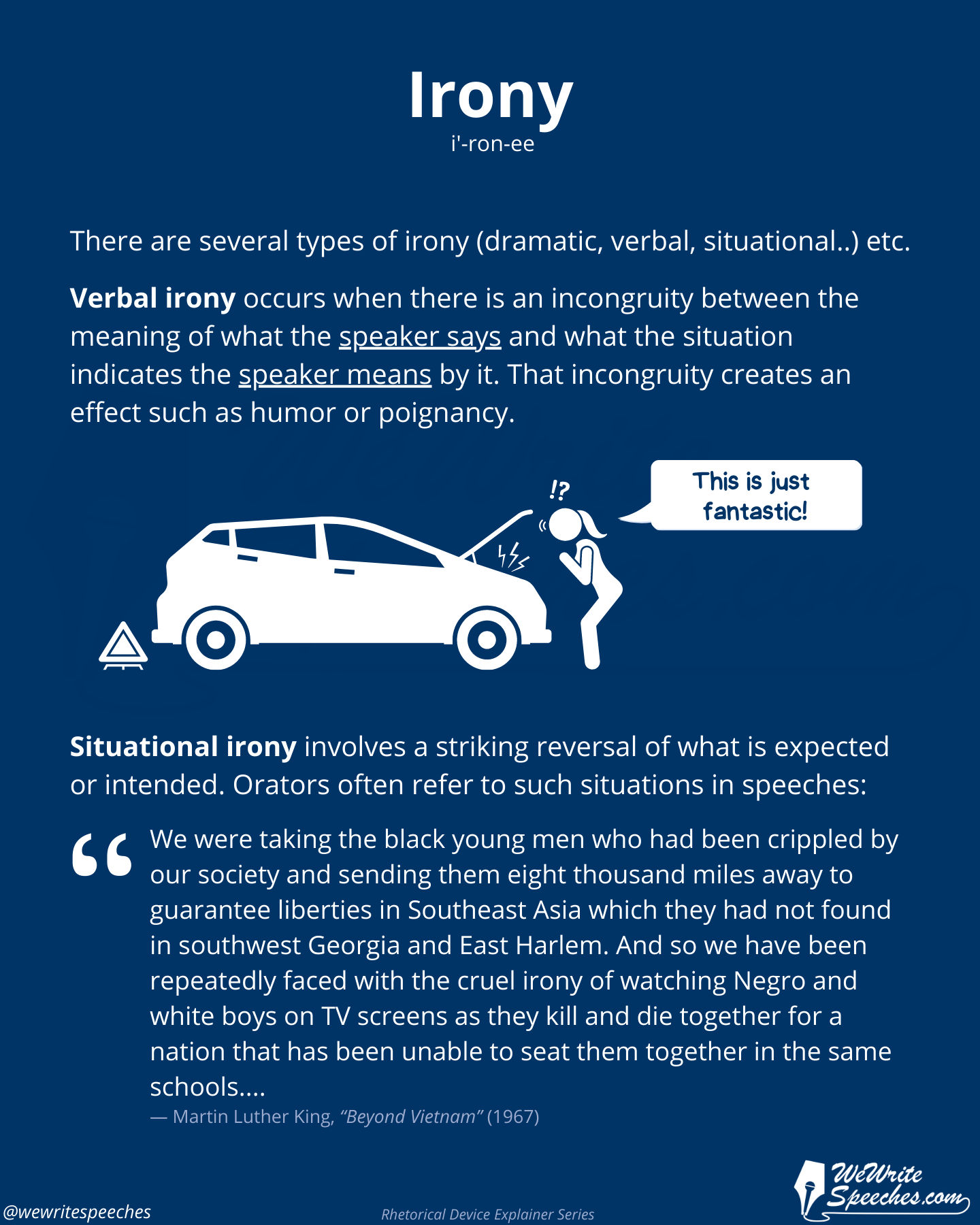Rhetorical Device: Irony
Irony is a rhetorical device used to bring attention to a situation, usually with the intention of creating humor or making a point. It is a way of expressing one’s feelings and thoughts in a more creative and effective way, by saying the opposite of what one really means. Irony can be a powerful and amusing tool for any speaker, and it can be used to great effect in speeches.
There are several types of irony, each with their own distinct purpose and style.
- Verbal irony is when someone says one thing but means the opposite, usually to make a point or joke.
- Situational irony occurs when something unexpected happens, such as a tragic event occurring on a day meant to be joyous.
- Dramatic irony is when the audience knows more than the characters, and they are able to see the events unfolding in a different way from how the characters see them.
Using irony in a speech can be an effective way to engage the audience and make a point. It can be used to highlight important topics, to draw attention to a certain point of view, to lighten up the tone of a speech or to make a joke. But not all kinds of irony lend themselves to public speaking; for example Dramatic irony does not. We will therefore focus on Verbal and Situational irony below.

Example - Verbal Irony
Verbal irony is very tricky to use successfully in a speech, because if all audience members aren't paying attention, or don't have strong signals as to what the speaker truly means, the message may get lost or misunderstood. An example of verbal irony would be if a person says "this is just great!" when their car breaks down in the middle of nowhere. In that case, the broken-down car makes the true meaning of the statement obvious.
In a speech, depending on the context, the orator can't necessarily rely on the audience being primed to understand the irony so they may have to do the priming themselves. Here is a famous (fictional) speech delivered by Mark Anthony after the assassination of Caesar where he appears to praise the assassins, particularly Brutus, while he is actually condemning them. The speaker demonstrates with several examples that Caesar wasn't overly ambitions, and this, combined with use of irony, amplified by repetition, shows us clearly who was ambitious and who was honourable.
Friends, Romans, countrymen, lend me your ears!
I come to bury Caesar, not to praise him.
The evil that men do lives after them,
The good is oft interred with their bones;
So let it be with Caesar. The noble Brutus
Hath told you Caesar was ambitious;
If it were so, it was a grievous fault,
And grievously hath Caesar answer'd it.
Here, under leave of Brutus and the rest
(For Brutus is an honorable man,
So are they all, all honorable men),
Come I to speak in Caesar's funeral.
He was my friend, faithful and just to me;
But Brutus says he was ambitious,
And Brutus is an honorable man.
He hath brought many captives home to Rome,
Whose ransoms did the general coffers fill;
Did this in Caesar seem ambitious?
When that the poor have cried, Caesar hath wept;
Ambition should be made of sterner stuff:
Yet Brutus says he was ambitious,
And Brutus is an honorable man.
You all did see that on the Lupercal
I thrice presented him a kingly crown,
Which he did thrice refuse. Was this ambition?
Yet Brutus says he was ambitious,
And sure he is an honorable man. William Shakespeare, "Julius Caesar, Act 3 Scene 2" (spoken by Mark Anthony)
Example - Situational Irony
It is important to understand that whereas verbal irony orignates with the speaker, situational irony already exists and is just pointed out by the speaker. Orators often call out situational irony in speeches which can have a powerful emotional impact on their audiences. Here is Martin Luther King in his anti Vietnam War speech:We were taking the black young men who had been crippled by our society and sending them eight thousand miles away to guarantee liberties in Southeast Asia which they had not found in southwest Georgia and East Harlem. And so we have been repeatedly faced with the cruel irony of watching Negro and white boys on TV screens as they kill and die together for a nation that has been unable to seat them together in the same schools...Martin Luther King, "Beyond Vietnam" (4 April 1967)
Here is Shakespeare again, this time with the character showing the irony inherent in Caesar's distaste for flatterers (though the speaker doesn't mention the word 'irony').
Never fear that. If he be so resolv'd,
I can o'ersway him; for he loves to hear
That unicorns may be betray'd with trees,
And bears with glasses, elephants with holes,
Lions with toils, and men with flatterers;
But when I tell him he hates flatterers
He says he does, being then most flattered.
Let me work;
For I can give his humor the true bent,
And I will bring him to the Capitol.
William Shakespeare, "Julius Caesar, Act 2 Scene 1" (spoken by Decius)
Further reading
- Smart Blogger: 20 Irony examples you don't need Visit
- Silva Rhetoricæ: The Forest of Rhetoric Visit
- Nordquist, Richard. "What Is Rhetorical Irony?" ThoughtCo Visit
- Wikipedia: Irony Visit
- MasterClass: What Is Irony? Different Types of Irony in Literature, Plus Tips on How to Use Irony in Writing Visit
